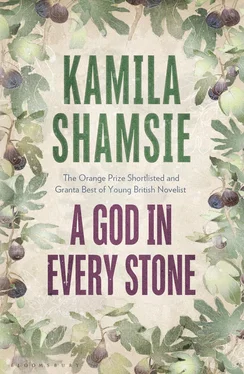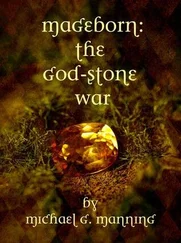Najeeb Gul hangs his head. I’m sorry, he says, his voice an admission of everything that she had only half believed to be true. Her husband catches him by the shoulders, places a foot on his backside and kicks him to the ground. He lands hard, and his bellow of pain suggests that the wounds he received in the day have re-opened. Her husband lifts him by the collar and drags him through the corridor and down the stairs, a trail of blood smearing the floor, and steps, the man screaming in pain. Zarina follows all the way to the storage room on the ground floor, watches her husband — this man who has never raised a finger in anger — kick Najeeb Gul inside and step in after him, closing the door behind him.
And now she is terrified. It is his gentleness she loves most. Once taken out of him how can it be put back? She bangs on the door, calls his name, and it’s only a few seconds later that he walks out, his face drawn, pale.
— What do you want me to do to him?
All this blood, the trail on her floor. She wants the smell of it gone.
— I don’t know, she says, and his relief is unmistakable.
— We’ll keep him there until my father comes back. He can decide.
Her husband bathes and binds the prisoner’s wounds, takes him tea and dried fruit which is all the sustenance there is in the house, but will not say a word to or about him. Although there’s a lock on the storage-room door he insists on sitting outside it, a rifle across his knee. He tells Zarina to sit with him but she can’t find a way to leave Diwa’s room, the girl’s scent still on her pillowcase, her clothes. Somehow she sleeps, and even in her dreams Diwa is already dead.
By morning her husband’s face has aged. Zarina tries to go in to see the prisoner but her husband says no, and won’t give her the key. But there is something she wants from Najeeb Gul — she wants the last hours of her sister-in-law’s life. How did she grow so brave, what allowed her to run through a street of men as if nothing could touch her?
— No, her husband says, and lays his head on his knees. I’m so tired, I’m so hungry. Where did they take my sister’s body?
The only thing she can attend to is hunger. She leaves the house, nothing but a chaddar to cover her head so the soldiers will think she’s only a woman, incapable of making trouble. The world is empty without Diwa, no life, no sound. And nothing to buy, nothing to eat. At Kabuli Gate an English officer tells her she can’t leave the Walled City, and she says it doesn’t trouble her but when her employer wants to know why his children’s ayah didn’t come to work she’ll tell him who was responsible. Who is her employer, he asks and she gives him the name of an Englishman who is a valued customer of her father-in-law, with two young children and an important position in government. The English officer speaks Urdu but doesn’t know enough to tell an ayah apart from the daughter-in-law of a merchant, or perhaps all Peshawaris look the same to him today just as every Englishman is a murderer to her. Either way, he waves her through. On the railway bridge leading into the Cantonment she sees the domes of the Peshawar Museum, and then it’s impossible to keep herself from going towards it.
Inside there’s an Englishwoman. That’s almost reason enough to leave, but the Englishwoman walks away, and Zarina can stand and look around the silent hall of idols. This is where he works, and this has something to do with the blackened metal band hidden in his turban which Diwa retrieved for him from beneath the wheels of an armoured car. She walks up to the two largest of the stone idols, wants to smash them. There’d be a satisfaction in watching them shatter on the ground, these giant unchanging figures which look onto the world with indifference, even today. But instead she turns to leave and as she’s going she sees a carving on a grey panel which draws her to it — a woman neither alive nor dead, neither entombed nor in the world of the living. Gone for ever. Zarina repeats those words to herself, tries to force them into meaning.
When her mother died she learned that when the living touch a corpse they understand, through their fingertips, that the dead are truly dead; no life is left in that coldness. This the fingertips understand, but without that touch the brain flounders. How is it possible that a whole universe of habits, humour, taste, tics, loyalties, loves has gone spinning into randomness, freed from the magnetic force of Diwa’s personality? Where is she lying now, has anyone said a prayer over her body, will Zarina for ever see her from beneath each burqa in the Walled City? If she must be dead let her be dead, but where is the body?
She returns home and the cook and his two sons are there, sitting outside the storage room with guns across their knees. There had been a moment in the Museum when the Englishwoman had said, Najeeb! and Zarina thought her husband had set him free. But it was the man who had come up to her balcony yesterday, and he said he was Najeeb’s brother. Why had he come to her balcony? What conspiracy is there between the brothers? She shouts through the door at Najeeb Gul but he doesn’t answer, and the cook says her husband has given him the key to the lock and made him swear on the Qur’an not to give it back to him or to let Zarina have it, and whatever the cook might personally believe to be the right choice in this matter the Qur’an is the Qur’an.
When her husband returns he’s found out who was responsible for putting the bodies in lorries, but no one knows where they were taken. He bangs with the flat of his palm on the door of the storage room, tells the cook he’ll fire him unless he gives the key back, and it is Zarina who pulls him away, tells him to be calm. The day crawls by, endless, pointless. There is a man imprisoned in the house and his presence is driving them both mad.
Another night passes. Soon, her father-in-law will return. With the withdrawal of the British the gates of the Walled City have opened and this morning the cook’s older son left for Kohat to give the family the terrible news. Zarina’s husband has gone to buy a grave plot in Shahji-ki-Dheri, and for now it is only Zarina, the cook and his younger son in the house. She’s upstairs in Diwa’s room when she hears the cook calling out to her from the hallway. He never comes to this part of the house, but the world is different now.
— They’ll all be here soon, he says when she comes outside to see what he wants. He’s been with the family longer than her husband and any of his siblings have been alive, and Diwa has always been — always was — his favourite.
— Yes. And?
— I’ve sworn I won’t give you the key to the room. But I haven’t sworn I won’t unlock it myself.
When the carpet-seller arrives he will set the captive free. Zarina knows it, her husband knows it, the cook knows it.
— I don’t know, she says.
— I’ll do it. I want to. How can we let him walk out of here after what he’s done?
— Let me think.
— I held her in my arms when she was a baby. I don’t need your permission.
He says it in kindness, lifting from her the burden of this responsibility, ensuring no one’s displeasure will fall on her.
— I want to talk to him, she says.
— You talk. I’ll do the rest.
They are partway down the corridor when the cook’s son runs up the stairs, breathless, to say two people have arrived: a man with a glass eye and an Englishwoman in a burqa who says the begum-sahib asked her about the lorries. How can they know he’s imprisoned here? It’s impossible. But they must be looking for him, and someone will have said he was here during the massacre. The cook has already told her that the neighbours have been asking about the man who went up on the roof when the women and children were there. Get your gun, she commands the cook and goes to find the frock-coat with the bullet hole which will convince Najeeb Gul’s brother and the Pashto-speaking Englishwoman from the Museum that the man they’re looking for is already dead. Let them think the lorries took him away.
Читать дальше












